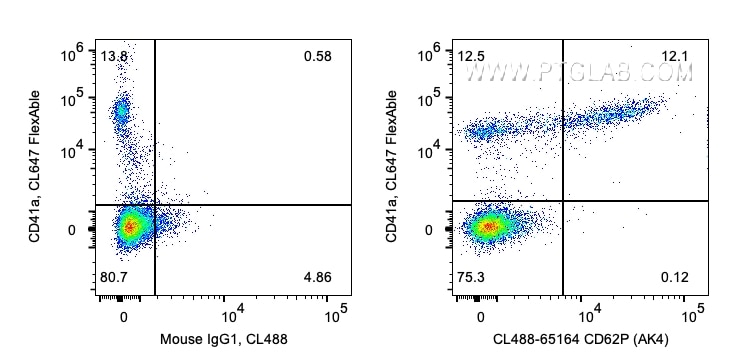Tested Applications
| Positive FC detected in | human peripheral blood platelets |
Recommended dilution
| Application | Dilution |
|---|---|
| Flow Cytometry (FC) | FC : 5 ul per 10^6 cells in 100 μl suspension |
| This reagent has been pre-titrated and tested for flow cytometric analysis. The suggested use of this reagent is 5 µl per 10^6 cells in a 100 µl suspension or 5 µl per 100 µl of whole blood. | |
| Sample-dependent, Check data in validation data gallery. | |
Product Information
CL488-65164 targets CD62P in FC applications and shows reactivity with human, non-human primates samples.
| Tested Reactivity | human, non-human primates |
| Host / Isotype | Mouse / IgG1, kappa |
| Class | Monoclonal |
| Type | Antibody |
| Immunogen |
Human platelets Predict reactive species |
| Full Name | selectin P (granule membrane protein 140kDa, antigen CD62) |
| Calculated Molecular Weight | 830 aa, 91 kDa |
| GenBank Accession Number | BC028067 |
| Gene Symbol | CD62P |
| Gene ID (NCBI) | 6403 |
| RRID | AB_3084155 |
| Conjugate | CoraLite® Plus 488 Fluorescent Dye |
| Excitation/Emission Maxima Wavelengths | 493 nm / 522 nm |
| Form | Liquid |
| Purification Method | Purified by protein-A affinity chromatography |
| UNIPROT ID | P16109 |
| Storage Buffer | PBS with 0.09% sodium azide and 0.5% BSA, pH 7.3. |
| Storage Conditions | Store at 2-8°C. Avoid exposure to light. Stable for one year after shipment. |
Background Information
P-selectin, also known as GMP140 or CD62P, is a transmembrane glycoprotein that mediates the interaction of activated endothelial cells or platelets with leukocytes. It is an adhesion molecule involved in the pathogenesis of inflammation, thrombosis, and oncogenesis. P-selectin is stored in the alpha-granules of platelets and Weibel-Palade bodies of endothelial cells. Upon cell activation by agonists, P-selectin is transported rapidly to the cell surface.




